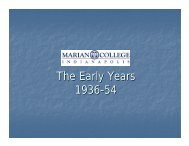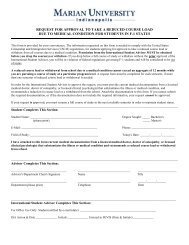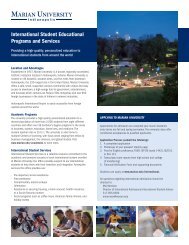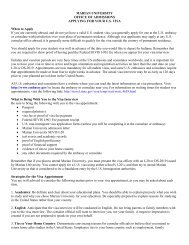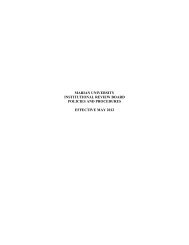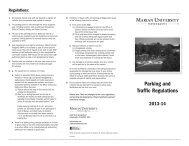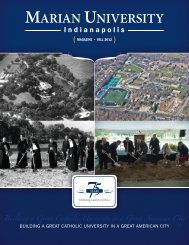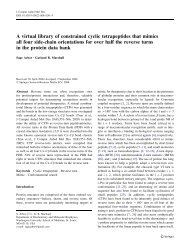2009-11 Marian University Course Catalog, fall 2010 edition
2009-11 Marian University Course Catalog, fall 2010 edition
2009-11 Marian University Course Catalog, fall 2010 edition
You also want an ePaper? Increase the reach of your titles
YUMPU automatically turns print PDFs into web optimized ePapers that Google loves.
CHE 310<br />
Biochemistry 4 credits<br />
Prerequisite: 305 or instructor permission. A study of the<br />
biomolecules that make up living systems and their function;<br />
enzyme action, kinetics, and inhibition; cellular metabolism<br />
and energy processes; the storage and transfer of biological<br />
information; laboratory procedures used in the study of<br />
proteins and other biomolecules. This course may be used to<br />
fulfill elective requirements in biology, or minor requirements<br />
in chemistry, but not both. Three lecture hours and three lab<br />
hours per week. (FAL)<br />
CHE 3<strong>11</strong><br />
Biochemistry I 4 credits<br />
Prerequisite: 306 or instructor permission. A study of the<br />
essential topics of modern biochemistry, presented both<br />
from the perspective of the chemical mechanisms at work<br />
and their role in regulation of a chemical pathway. The<br />
laboratory sessions are designed to provide students with<br />
opportunities to gain hands-on understanding of many of<br />
these topics. Three lecture hours and three lab hours per<br />
week. (FAL)<br />
CHE 312<br />
Biochemistry II 4 credits<br />
Prerequisite: 3<strong>11</strong>. A continuation of CHE 3<strong>11</strong>. Three lecture<br />
hours and three lab hours per week. (SPR)<br />
CHE 315<br />
Environmental Toxicology 3 credits<br />
Prerequisite: 306 or instructor permission. A study of the<br />
impact of environmental toxicants on living systems,<br />
including types of exposure, acute and chronic effects,<br />
species differences, mechanisms of carcinogenesis and<br />
teratogenesis, and a survey of the major classes of chemical<br />
agents commonly encountered in our living environment.<br />
Three lecture hours per week. (SPR)<br />
CHE 325<br />
Physical Chemistry I 4 credits<br />
Prerequisites: 152 or equivalent preparation and MAT 230,<br />
231, or instructor permission. A study of the physical basis of<br />
chemistry including classical and statistical thermodynamics,<br />
chemical kinetics, quantum mechanics, and the fundamental<br />
principles of atomic and molecular spectroscopy. Laboratory<br />
focuses on the application of the methods of physical<br />
chemistry to experimental measurements and data analysis<br />
and the solution of theoretical problems using computerbased<br />
and other methods. Three lecture hours and three lab<br />
hours per week. (2FO)<br />
CHE 326<br />
Physical Chemistry II 4 credits<br />
Prerequisite: 325. A continuation of CHE 325. Three lecture<br />
hours and three lab hours per week. (2SE)<br />
CHE 410<br />
Advanced Organic Chemistry 3 credits<br />
Prerequisites: 306 or instructor permission. Molecular<br />
structure, kinetics, and mechanisms with emphasis on the<br />
most recent advances in organic chemical theory. Three<br />
lecture hours per week. (ADD)<br />
CHE 420<br />
Instrumental Analysis 4 credits<br />
Prerequisite: 300 or instructor permission. A study of the<br />
theory and practice of modern chemical instrumental analysis<br />
including elementary electronics and microprocessors, optical<br />
spectroscopy, atomic and emission spectroscopy,<br />
chromatography, nuclear magnetic resonance spectroscopy,<br />
and electroanalytical techniques. Three lecture hours and<br />
three lab hours per week. (2SO)<br />
CHE 425<br />
Advanced Physical Chemistry 3 credits<br />
Prerequisites: 326 and MAT 315. Advanced topics in physical<br />
chemistry continuing from 326. Three lecture hours per<br />
week. (ADD)<br />
CHE 430<br />
Advanced Inorganic Chemistry 3 credits<br />
Prerequisite: 320, 321, or instructor permission. The structure<br />
and properties of solid materials and molecular inorganic<br />
compounds based on modern concepts of symmetry and<br />
chemical bonding. Three lecture hours per week. (ADD)<br />
CHE 435<br />
Physical Biochemistry 4 credits<br />
Prerequisites: 312 and 326. A study of the problems and<br />
applications of physical chemistry methods to modern<br />
biochemistry. There is emphasis on experimental techniques.<br />
Topics will include spectroscopy, chromatography,<br />
sedimentation, electrophoresis, relaxation kinetics, and<br />
theories of isotope labeling. Three lecture hours and three<br />
lab hours per week. (ADD)<br />
CHE 360, 460<br />
Internship in Chemistry 2-6 credits<br />
Prerequisites: 18 credits in chemistry courses numbered 151<br />
or above, and department permission. The internship in<br />
chemistry is designed to give qualified students the<br />
opportunity to obtain credit for work conducted off-campus.<br />
Work experience at national laboratories, major research<br />
institutions, and within the chemical industry may qualify.<br />
Placement is arranged after a review of the proposed<br />
experience has been approved by the department faculty.<br />
Periodic reports must be submitted by the student and the<br />
sponsoring institution. A minimum of 200 hours of work<br />
experience in chemistry is required to earn three credits. May<br />
enroll for two to six credits. Graded S/U. (ADD)<br />
82



